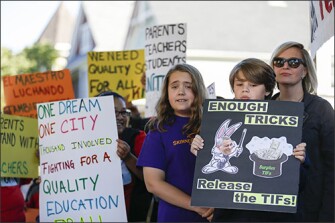The Chicago school district and the city’s teachers’ union struck a last-minute deal on a contract shortly before a midnight deadline and averted a strike that was set to begin this morning.
The deal came after a marathon negotiating session on Monday, as well as sessions through the weekend. Union members had been set to picket beginning at 6 a.m. on Tuesday.
Shortly before midnight on Monday, Karen Lewis, the president of the Chicago Teachers Union, announced that the two sides had reached a tentative agreement. The union last struck in 2012, staying out of classrooms for seven days.

Lewis said the union was able to get a “commitment” from the city’s Board of Education on class sizes, layoffs, continuing contributions to members’ pensions, and other provisions she said would make the classroom work better.
It was “not a perfect agreement,” she said.
“What we found is that what we ended up with is something that’s good for kids, it’s good for clinicians, it’s good for paraprofessionals, for the teachers, for the community,” she said.
The tentative pact, which has to be approved by the union’s House of Delegates and full membership, covers four years and runs through June 2019.
A major area of contention going into the last-minute negotiations was the fate of the so-called pension pickup. Under a long-standing policy the district paid 7 percent of union members’ pension contributions, while the union members paid 2 percent. The district wanted to eliminate the practice, which had been negotiated years ago in lieu of wage increases, and the union had consistently objected and threatened to strike over it.
In this new proposal, the district will continue the pension pickup for current CTU members. However, members hired after Jan. 1, 2017, will not receive it.
But Lewis noted in her remarks to the media that there will be a phased-in increase in the base salary to help make up for the loss of the pick-up for new members.
According to the tentative agreement, the base salary will increase by 3.5 percent after January and then by another 3.5 percent after July 2017.
Steps and lanes will also be restored. The proposal also contains a 2 percent cost of living adjustment in 2018 and 2.5 percent in 2019.
The proposal also includes changes to union members’ health insurance plans and an increase in their contributions towards their premiums.
Beginning next semester, a teacher or instructor assistant will be assigned to K-2 classrooms with more than 32 students. The pact also calls for more money, up to $7 million a year during the contract, to go to overenrolled K-2 classes.
The board must discuss with the union any decision to contract for certified nurses and alternatives to doing so.
Teachers who notify CPS of their intention to retire by March 31, 2017 will be eligible to receive a one-time lump sum bonus as part of an early retirement incentive. The district is hoping that at least 1,500 teachers sign up. A similar incentive, though with a lower dollar value, is available to other union members.
The proposal also includes an agreement to hire a mutually agreed upon expert to review the district’s teacher-evaluation system.
The board will no longer require, by the 2017-18 school year, that special education teachers take on case management responsibilities. The contract also calls for the district, in cooperation with the union, to develop a plan to limit special education teachers’ workload.
The two sides still have to work out school schedules that will allow full time elementary teachers at least 15 minutes of preparation time at the beginning of the school day, by January 2017.
Lewis conceded that the union and district would have to continue working on some outstanding issues during the year. The union, for example, wanted more social workers in schools.
Teachers were ready to walk off en masse on Tuesday. Many had picked up pickets signs at a union hall on Monday.
The union, in February, had rejected a proposal from the school district. Some provisions from that rejected offer—including a commitment to a charter school cap—remain as part of the tentative agreement.
The union had also called for the city to use surplus proceeds from a special financing tool, known as Tax Increment Financing, or TIF, to go toward the schools.
A mayoral spokesman confirmed to Chicago media that Mayor Rahm Emanuel planned to increase the amount of TIF funds going to CPS. The Chicago Tribune reported that CPS could get at least half of the $175 million in surplus TIF funds.
Emanuel is expected to clarify that in his budget address on Tuesday morning.
In a hastily assembled press conference at City Hall after the contract deal was announced, Emanuel said, according to the Tribune:
“The teachers’ hard work will be respected in this contract, and appropriately rewarded. Chicago Public Schools’ finances will be stronger and on firmer ground because of this agreement. Parents and taxpayers will be relieved, and more importantly, reassured, that we all came together to work together with a common purpose.”
Emanuel was flanked by CPS officials, including School Board President Frank Clark, District CEO Forrest Claypool, and Chief Education Officer, Janice Jackson.
Image: Parents and schoolchildren demonstrate near Mayor Rahm Emanuel’s home on Oct. 10 to show support for Chicago Public School teachers.
--Jose M. Osorio/Chicago Tribune via AP
